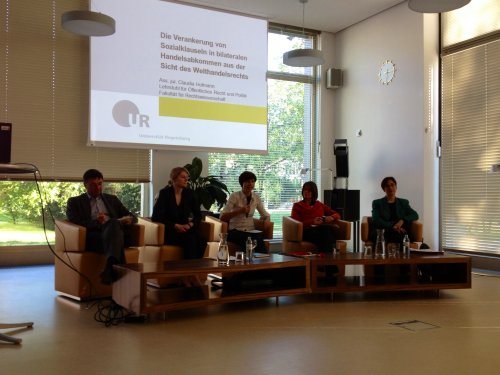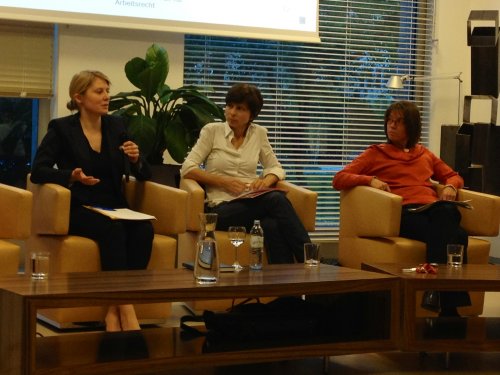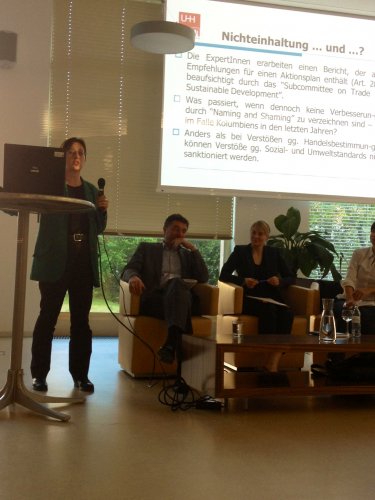Book presentation: Labour Rights on the Negotiating Table – Touchstone Colombia
On April 25 2012 the book presentation “Labour Rights on the Negotiating Table – Touchstone Colombia” took place in the library of the Chamber of Labour Vienna (AK Vienna). This was on the occasion of publication of the collected volume „Sozialkapitel in Handelsabkommen“ [“Social Chapters in Trade Agreements”], edited by Christoph Scherrer and Andreas Hänlein and published by Nomos Verlag.
Three co-authors, amongst them Karin Lukas, head of the team Human Rights in Development Cooperation and Business at the Ludwig Boltzmann Institute of Human Rights, presented the book. EU Parliament member Jörg Leichtfried was also on the panel, and gave an insight into the actual state of debate concerning trade relations from Brussels.
Since 2007 the EU has been negotiating bilateral free trade agreements (FTA) with third countries, in some of which there’s not even sufficient protection for the most fundamental labour rights. Against this background, voices were being raised demanding to further safeguard employees’ rights by means of social chapters in FTAs. The Nomos collected volume adds to this debate with contributions from Thomas Greven, Andreas Hänlein, Claudia Hofmann, Karin Lukas, Christoph Scherrer, Hariati Sinaga, Astrid Steinkellner und Reingard Zimmer. It gives reasons and justifications for social chapters in trade agreements from an economic, legal and political point of view. In addition it presents sample texts for social standards in sustainability chapters of FTAs.
The focus of the event was on three contributions made by the legal scholars Claudia Hofmann (University of Regensburg, Germany), Karin Lukas (BIM) and Reingard Zimmer (University of Hamburg, Germany). Following the welcoming remarks by Valentin Wedl, head of the department EU & International Affairs at AK Vienna, Èva Dessewffy (AK Vienna) did the moderation. First of all, Claudia Hofmann presented the multilateral level: she explained whether and under which conditions social standards in bilateral trade agreements were permitted according to international trade law.
Subsequently, Karin Lukas introduced the contribution by her and Astrid Steinkellner dealing with the bilateral level: starting with a short overview of existing trade agreements containing social norms, she presented the sample texts for social norms in sustainability chapters of FTAs for future negotiations with either developing or industrialized countries. These sample texts were being developed from best-practice elements of existing agreements which accounts for their practicability. Finally, Reingard Zimmer spoke on the case of Colombia, which is a highly controversial issue as the EU is currently in negotiations with this country. More than half of the worldwide murders of trade unionists are being committed in Colombia. However, the FTA doesn’t contain any compulsory mechanism for the protection of trade unions’ rights.
Subsequent to the presentations, Jörg Leichtfried, delegation leader of the Austrian Social Democrats in the European Parliament and executive member of the International Trade Committee, was asked on his parliamentary group’s view on the integration of minimum social standards in FTAs. The Lisbon Treaty has strengthened the role of the European Parliament in terms of trade policy, which concerns both information rights and co-decision rights. Thus, for the first time the Parliament has the chance, to press for the integration of binding minimum standards for labour and environmental issues. Clearly, this could be the touchstone for the conclusion of EU free trade agreements in future. However, at the moment even the outcome of a parliamentary vote on the FTA with Colombia is anybody’s guess.
The event was held in German.
The program and presentations may be downloaded below (in German).
b. Co-author Claudia Hofmann explaining aspects of social norms in the international trade context
c. Presentation by Reingard Zimmer on the EU trade agreement with Colombia and Peru


